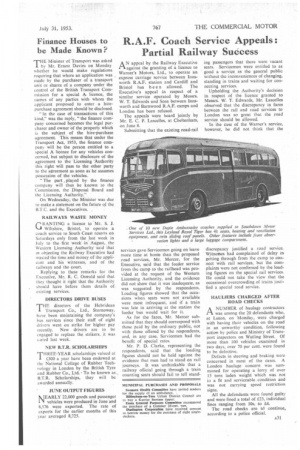R.A.F. Coach Service Appeals: Partial Railway Success
Page 33

If you've noticed an error in this article please click here to report it so we can fix it.
AN appeal by the Railway Executive against the granting of a licence to Warner's Motors, Ltd., to operate an express carriage service between Innsworth R.A.F. station and Cardiff and Bristol has been allowed. The Executive's appeal in respect of a similar service operated by Messrs. W. T. Edwards and Sons between Innsworth and Barnwood R.A.F. camps and London has been refused.
The appeals were heard jointly by Mr. E. C. P. Lascelles, at Cheltenham, on June 8.
Submitting that the existing road-rail services gave Servicemen going on leave more time at hom'e than the proposed road services, Mr. Mercer, for the Executive, said that the feeder service from the camp to the railhead was provided at the request of the Western Licensing Authority, and the evidence did not show that it. was inadequate, as was suggested by the respondents. Loading figures showed that the occasions when seats were not available were most infrequent, and if a train was late in arriving at the station the feeder bus would wait for it.
As for the fares, Mr. Mercer submitted that they should correspond with those paid by the ordinary public, not with those offered by the respondents, ' and, in any case, Servicemen had the benefit of special rates.
Mr. P. D. Clarke, representing the respondents, said that the loading figures should not be held against the evidence that men had to stand on rail journeys. It was unthinkable that a railway official going through a train counting seats should fail to tell stand ing passengers that there were vacant seats. Servicemen were entitled to as good a service as the general public without the inconveniences of changing, standing in trains and waiting for connecting services.
Upholding the Authority's decision in respect of the licence granted to Messrs. W. T. Edwards, Mr. Lascelles observed that the discrepancy in fares between the rail and road services to London was so great that the road service should be allowed.
In the case of the Warner's service, however, he did not, think that the
discrepancy justified a roadservice. Witnesses had complained of delay in getting through from the camp to connect with rail services, but the complaints were not confirmed by the loading figures on the special rail services. He could not take the view that the occasional overcrowding of trains justified a special road service.
HAULIERS CHARGED AFTER ROAD CHECKS
ANUMBER of haulage contractors was among the 20 defendants who, at Luton, on Monday, were charged with having their vehicles on the road in an unworthy condition, following action by police and Ministry of Transport inspectors on Watling Street. Of more than 100 vehicles examined in two days, over 70 per cent, were found to be defective.
Defects in steering and braking were concerned in most of the cases. A London haulage concern was summoned for operating a lorry of over 15 tons laden weight which was not in a fit and serviceable. condition and was not carrying speed restriction signs.
All the defendants were found guilty and were fined a total of £23, individual fines ranging from 10s. to £4.
The road checks are td continue, according to a police official.




















































































